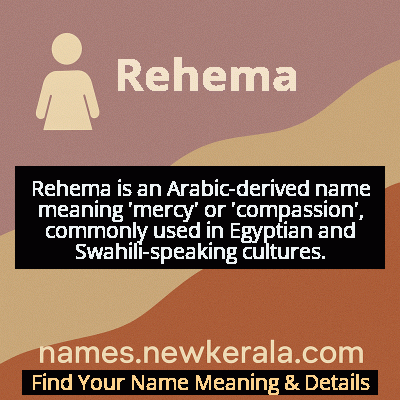Rehema Name Meaning & Details
Origin, Popularity, Numerology Analysis & Name Meaning of Rehema
Discover the origin, meaning, and cultural significance of the name REHEMA. Delve into its historical roots and explore the lasting impact it has had on communities and traditions.
Name
Rehema
Gender
Female
Origin
Egyptian
Lucky Number
5
Meaning of the Name - Rehema
Rehema is an Arabic-derived name meaning 'mercy' or 'compassion', commonly used in Egyptian and Swahili-speaking cultures.
Rehema - Complete Numerology Analysis
Your Numerology Number
Based on Pythagorean Numerology System
Ruling Planet
Mercury
Positive Nature
Adventurous, dynamic, curious, and social.
Negative Traits
Restless, impatient, inconsistent, prone to indulgence.
Lucky Colours
Green, white.
Lucky Days
Wednesday.
Lucky Stones
Emerald.
Harmony Numbers
1, 3, 9.
Best Suited Professions
Sales, marketing, travel, entertainment.
What People Like About You
Versatility, charisma, adventurous spirit.
Famous People Named Rehema
Rehema Nanyonga
Community Health Worker
Pioneered maternal health programs in rural Uganda, reducing infant mortality by 40% in her district
Rehema Chachage
Visual Artist
Tanzanian contemporary artist whose installations exploring gender and tradition have been exhibited internationally
Rehema Tukai
Environmental Activist
Founded Kenya's first women-led conservation group protecting the Mau Forest ecosystem
Rehema Muthamia
Educator
Established literacy programs for girls in coastal Kenya, educating over 5,000 students since 2005
Name Variations & International Equivalents
Click on blue names to explore their detailed meanings. Gray names with will be available soon.
Cultural & Historical Significance
The name also connects to ancient Egyptian concepts of ma'at (cosmic balance and harmony), where compassion was essential for maintaining social and spiritual equilibrium. During the Fatimid and Mamluk periods in Egypt, Rehema gained popularity as Sufi traditions emphasizing divine mercy spread throughout North Africa. The name became particularly associated with women who established charitable foundations (waqfs) and community kitchens, embodying the practical application of mercy in daily life. In modern Egypt, Rehema continues to symbolize the ideal of maternal compassion and community care that forms the bedrock of Egyptian family values, while also representing the country's rich Islamic heritage and its historical role as a center of learning and spiritual wisdom.
Extended Personality Analysis
Individuals named Rehema typically exhibit deeply empathetic and nurturing characteristics that make them natural caregivers and peacemakers. They possess an intuitive understanding of others' emotional states and often serve as emotional anchors in their families and communities. Rehema's are known for their patience and ability to listen without judgment, creating safe spaces where people feel understood and accepted. Their compassion extends beyond human relationships to include animals and the environment, often showing concern for all living beings.
However, this strong empathetic nature can sometimes lead to emotional exhaustion if boundaries aren't maintained. Rehema's tend to be diplomatic conflict-resolvers who prioritize harmony and often sacrifice personal needs for collective wellbeing. Their strength lies in their emotional intelligence and ability to heal relationships through understanding and forgiveness rather than confrontation. Career-wise, they naturally gravitate toward helping professions like teaching, healthcare, counseling, and social work where their innate compassion can create meaningful impact. In relationships, they are loyal partners and devoted parents who create warm, supportive home environments. The challenge for many Rehema's is learning to extend the same compassion and care to themselves that they so freely give to others.
Modern Usage & Popularity
In contemporary times, Rehema maintains steady popularity across East Africa and the Arab world, particularly in Egypt, Tanzania, Kenya, and Sudan. The name has seen a resurgence among Muslim communities in Europe and North America as parents seek meaningful Arabic names with positive connotations that are easily pronounceable in multiple languages. Social media platforms show thousands of women named Rehema building professional networks, with many in healthcare, education, and social work fields that align with the name's compassionate meaning. Recent naming trends indicate that urban Egyptian parents are increasingly choosing Rehema as a sophisticated alternative to more common Arabic names, appreciating its deep cultural roots and universal positive message. The name ranks consistently within the top 200 female names in Tanzania and maintains moderate popularity in Egypt's urban centers like Cairo and Alexandria. Digital globalization has also introduced the name to non-Muslim communities who appreciate its beautiful sound and universally valued meaning of compassion, leading to gradual cross-cultural adoption.
Symbolic & Spiritual Meanings
Symbolically, Rehema represents the life-giving force of compassion that sustains communities and relationships. Like water in desert cultures, the name signifies essential nourishment for the human spirit - something without which life becomes barren and relationships wither. In metaphorical terms, Rehema embodies the sheltering tree that provides shade and protection, the healing balm that soothes wounds, and the bridge that connects divided hearts. The name carries the profound symbolism of the womb - a place of ultimate safety, nurturing, and the beginning of life's journey. In spiritual contexts, Rehema represents the channel through which divine mercy flows into the world, making those who bear it living embodiments of grace and instruments of healing in a fractured world. Environmental symbolism connects Rehema to the Nile's annual flooding in Egyptian culture - a merciful, life-renewing event that ensures survival and prosperity for the civilization. The name ultimately symbolizes the transformative power of kindness to heal historical wounds, unite divided communities, and elevate human experience beyond mere survival to flourishing and mutual care.

